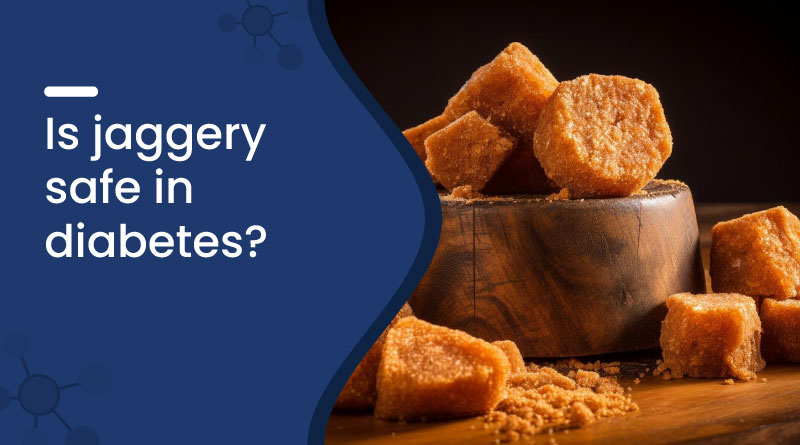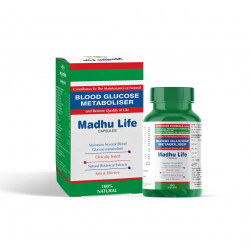Is Jaggery Safe for Diabetes?


Jaggery is often marketed as a natural and healthier alternative to sugar. But is jaggery safe in diabetes? This is a common question among people managing their blood sugar levels. While jaggery may seem better than refined sugar, its effect on blood glucose needs to be clearly understood—especially by those with diabetes. This blog breaks down the facts to help you make informed dietary decisions.
What Is Jaggery and How Is It Made?
Jaggery is an unrefined sweetener made by boiling sugarcane or palm sap. It retains more nutrients compared to white sugar due to minimal processing. You’ll commonly find it in solid blocks or powder form, used in sweets, beverages, and Ayurvedic remedies.
Key nutrients in jaggery include:
- Iron
- Potassium
- Calcium
- Magnesium
Despite its mineral content, jaggery is still a concentrated source of sugar, and that's where the concern for diabetics begins.
Does Jaggery Raise Blood Sugar Levels?
Yes, jaggery does raise blood sugar levels. It has a high glycemic index (GI), usually ranging from 84 to 95, which means it causes a rapid spike in blood glucose levels after consumption.
Even though it is less processed than sugar, jaggery contains sucrose and glucose, both of which directly impact blood sugar. For people with type 1 or type 2 diabetes, controlling blood sugar spikes is crucial, and jaggery can interfere with that control.
Also Read - Tablets For Blood Sugar
Is Jaggery Better Than Sugar for Diabetics?
Nutritionally, jaggery offers trace minerals that white sugar lacks. However, from a diabetic management perspective, both are similar in carbohydrate content and glycemic load.
- 100g of jaggery has about 380 calories, like refined sugar.
- Both can cause sudden insulin response and lead to fluctuations in blood sugar levels.
Bottom line: Just because jaggery is natural doesn’t make it safe for diabetics.
Can Diabetics Eat Jaggery in Moderation?
Some people believe that consuming a small amount of jaggery occasionally is acceptable. However, even moderate intake can trigger sugar spikes. The body's insulin response doesn't differentiate between jaggery and sugar.
If you have prediabetes or diabetes, it's best to:
- Avoid jaggery altogether, especially in raw form.
- Consult your doctor before using any sweeteners.
- Explore low-GI alternatives like stevia or monk fruit.
What Are the Risks of Eating Jaggery in Diabetes?
Consuming jaggery while managing diabetes may lead to:
- Blood sugar fluctuations
- Increased insulin resistance
- Cravings for more sweets
- Potential weight gain, worsening diabetic symptoms
People with uncontrolled diabetes must be especially cautious, as jaggery can accelerate complications like neuropathy, kidney damage, and eye disorders.
What Are the Alternatives to Jaggery for Diabetics?
Instead of jaggery, diabetics can use:
- Stevia – natural, zero-calorie sweetener
- Erythritol – sugar alcohol with minimal effect on glucose
- Monk fruit extract – low GI, no aftertaste
- Cinnamon powder – for mild natural sweetness and possible glucose-lowering effects
These options are generally considered safe for blood sugar control when used in moderation.
Also Read - Are Walnuts Good for Diabetes?
Should Diabetics Avoid Natural Sugars Like Jaggery?
Yes, diabetics should be cautious with all forms of sugar—natural or processed. Jaggery, honey, and coconut sugar may seem healthier, but they still elevate blood glucose significantly. The source of sugar matters less than its impact on your metabolism.
If you’re craving something sweet, focus on:
- Low-GI fruits (e.g., berries, apples)
- Protein-rich snacks
- Unsweetened yogurt with nuts
These choices won’t spike sugar levels and help satisfy cravings.
Also Read - Diabetes Medicine Names With Price in India
Frequently Asked Questions
Q. Can jaggery be used in diabetic sweets?
A. No, jaggery has a high glycemic index and spikes blood sugar. It is not safe for diabetic-friendly sweets.
Q. Is organic jaggery better for diabetics?
A. Organic jaggery may be free from chemicals but still impacts blood sugar similarly. It’s not recommended for diabetes.
Q. How much jaggery is safe in diabetes?
A. Ideally, no amount of jaggery is considered safe if you have diabetes. Even small quantities can cause glucose spikes.
Q. Can jaggery help with iron deficiency in diabetics?
A. Jaggery has iron, but its sugar content outweighs the benefit. Diabetics should opt for iron-rich vegetables or supplements.
Q. What is a better sweetener for diabetics than jaggery?
A. Stevia, monk fruit, and erythritol are better options as they do not raise blood sugar levels.
Conclusion
So, is jaggery safe in diabetes? The answer is no. While jaggery is natural and nutrient-rich, it behaves similarly to sugar in the body. It has a high glycemic index and quickly raises blood sugar. Diabetics must avoid jaggery and opt for low-GI, blood sugar-friendly sweeteners. Always consult your healthcare provider before making any dietary changes, especially when managing a chronic condition like diabetes.
Asana (70mg) + Karela (90mg) + Bimbi (45mg) + Methi (70mg) + Jamun (75mg) + Meshashringi (40mg) + Neem (30mg) + Rohitak (25mg) + Sharpunkha (20mg) + Sudh Shilajeet (20mg) + Trivang Bhasma (10mg) + Vasant Kusumakar Ras (5mg) + Bhawna Rajni (50mg) + Saptachakra (50mg) + Arjun (50mg)
100 Capsules Per Jar
Recent Blogs
Disclaimer : Zeelab Pharmacy provides health information for knowledge only. Do not self-medicate. Always consult a qualified doctor before starting, stopping, or changing any medicine or treatment.

















 Added!
Added!